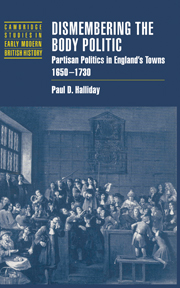Book contents
- Frontmatter
- Contents
- Preface
- List of abbreviations
- Part one Corporate ideal and partisan reality
- Part two The King and his corporations, 1660–1688
- 5 The corporations and their charters, 1660–1682
- 6 Quo warranto and the King's corporations, 1682–1685
- 7 Revolution in the corporations, 1685–1688
- Part three Partisan conflict and the law in a dynamic society
- Appendix A Royal charters of incorporation, 1660–1727
- Appendix B Enforcement of the Corporation Act, 1662–1663
- Select bibliography
- Index
- Titles in the series
6 - Quo warranto and the King's corporations, 1682–1685
Published online by Cambridge University Press: 10 November 2009
- Frontmatter
- Contents
- Preface
- List of abbreviations
- Part one Corporate ideal and partisan reality
- Part two The King and his corporations, 1660–1688
- 5 The corporations and their charters, 1660–1682
- 6 Quo warranto and the King's corporations, 1682–1685
- 7 Revolution in the corporations, 1685–1688
- Part three Partisan conflict and the law in a dynamic society
- Appendix A Royal charters of incorporation, 1660–1727
- Appendix B Enforcement of the Corporation Act, 1662–1663
- Select bibliography
- Index
- Titles in the series
Summary
The Earl of Huntingdon shook a stick over Leicester's head, but he also dangled a carrot: “All corporations of England have surrendered and even the most factions, and all are generally subject to the quo warrantos and it is probably such writs will issue against the refusers with greater disadvantage and if Leicester do surrender, if they desire any enlargement of privileges, I believe they may be obtained.” By September 1684, Leicester corporation was tangled in the same legal and political net cast by the crown over all the nation's boroughs. Willing county gentlemen and nobles like Huntingdon were crucial to the effort. Once one of the Earl of Shaftesbury's chief lieutenants in the Exclusion effort, Huntingdon had “kissed his majesty's hand” in October 1681, and quickly rose to prominence at court. He then set about persecuting dissenters with the same zeal he once showed in attacking the Duke of York. To demonstrate his loyalty and to restore his family's ancient influence over the town, Huntingdon prodded Leicester to follow the lead set in scores of other towns surrendering their charters and receiving new ones in the mid-1680s.
Huntingdon stayed away from town throughout the delicate proceedings by which surrender and regrant were arranged, all the while keeping a tight hold on strings that should not be seen reaching back to himself. John Geary, rector of a living in his gift, monitored the “several cabals” in the corporation as they pondered what to do in the face of the quo warranto threatened against them.
- Type
- Chapter
- Information
- Dismembering the Body PoliticPartisan Politics in England's Towns, 1650–1730, pp. 189 - 236Publisher: Cambridge University PressPrint publication year: 1998



